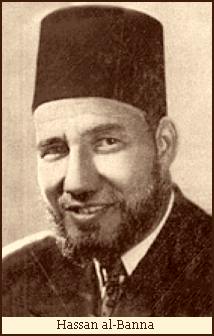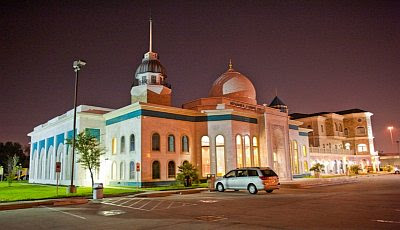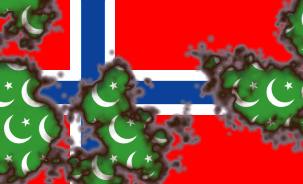Most Gates of Vienna readers are already familiar with the work of Prof. Dr. Hans Jansen, a retired Professor of Modern Islamic Thought at the University of Utrecht.
Dr. Jansen was the keynote speaker at the Brussels Conference in the European Parliament two weeks ago. A video of his speech (with improved audio) is embedded at the bottom of this post, along with videos of his testimony at the trial of Geert Wilders in the fall of 2010. The text of Dr. Jansen’s speech in Brussels is here, and the transcript of his trial testimony is here.
The paper below was originally presented by Dr. Jansen to U.S. government officials at a conference in Arlington, Virginia in 2006. We are deeply grateful to the author for sending it to us. The Muslim Brotherhood Movement: A Glance at its History and Ideology
The Muslim Brotherhood Movement: A Glance at its History and Ideology
By Prof. Dr. Johannes J.G. JansenThe West has enemies, and these enemies have declared war on us. Our enemies have no difficulty at all in identifying us, but we, on the contrary, have great difficulty in identifying them. It is with good reason that we hesitate to identify them, because if one of the great world religions is our sworn enemy, we are in for a difficult period. However, life has been difficult before, and as you all know the free world managed to survive both Nazism and Communism.
However, Europe on its own could never have survived the Nazis, or the Communists. American involvement in these struggles has been essential for the survival of Europe, and the same is true for the present battle. If the US does not participate in the present battle with all resources that are needed, especially its intellectual resources, the battle we are in will eventually be lost. Then Europe will fall. The fall of Europe may have long term consequences for the US. It is better not to speculate about these consequences.
The US war effort, any war effort, has to be directed against an enemy who can be named and identified. It is obvious that this is a
political necessity because as you all know wars have to be supported by public opinion, but there is more to it. Without an identified and named enemy all war efforts are wasted. Without a named and identified enemy the war effort is not a war effort, but it is an exercise, and probably even an exercise in futility. The hesitation by the US authorities and media to name and define our present enemy undermines the security of the US, and hence the security of the rest of the world. In Europe, the situation in this respect is of course much, much worse.

The program of today’s conference suggests that we are not at war with Islam, or the majority of the Muslims, but with the Muslim Brotherhood. This organization was founded in the late twenties in Egypt, by a primary-school teacher who was at that point in time 23 years old. His name was Hasan al-Banna. The first pamphlet al-Banna wrote has not been included in any collection of his works. It is an undated pamphlet, but internal evidence suggests it was written in May 1929, and published not much later, probably in June 1929. The pamphlet is an attack on the Egyptian educational system, which is interesting, but even more interesting is that the pamphlet contains long paragraphs full of praise for the Italian Fascist leader Benito Mussolini. If there ever was any doubt that European fascism played the role of midwife at the birth of modern Muslim radicalism, this pamphlet will take all your doubts away.
The movement which Al-Banna founded was definitely not stillborn. Let us take a look at the numbers. A successful new religious movement, like the Mormons, if for clarity’s sake I may use that popular appellation, normally expands by a forty percent in ten years. Al-Banna’s movement, on the contrary, grew by one hundred percent each year. This incredible but reliably documented percentage means that the Muslim Brotherhood was not your average new religious movement that had to struggle to win over the hearts and minds of the people who crossed its path. The Muslim Brotherhood did not have to convince people of new truths; it was a movement that preached to the converted. Muslims who came into contact with the Brotherhood soon realized that they agreed with the slogans of the Brotherhood, of which the most important are
al-qur’aan dusturnaa wa-l-jihaad sabiiluna, the Koran is our law and jihaad is our way. I suggest we take these slogans seriously.
First, something about ‘the Koran is our law’,
al-qur’aan dusturnaa. The Koran is a difficult book that contains dozens of passages that even the initiated and the heavily bearded do not understand. But a few things are remarkably clear. For instance in 9:30 the Koran talks about people who believe that Jesus of Nazareth is the son of God. Now to believe that Jesus is the son of God is a perfectly respectable belief that has been held by millions of respectable people for the past two millennia. If, however, the Koran were to be the law of the land, there would be a problem for these people, because the Koran explicitly curses and damns these people (9:30), and the Koran even expresses the wish that people who believe that Christ is the son of God shall be killed in battle,
qaatalahumullaah. May I remind you: The Brotherhood wants this document, the Koran, to be the law, and this document, the Koran, contains many, many more passages that are similar, or worse, or much worse.
Second, something about Jihad, the ‘way’ of the Brotherhood, according to their own slogan. Friends of Islam often argue that Jihad is a rich concept that may have a whole lot of positive connotations, and that it certainly is not something as crude as a holy war. It is true that Jihad is not war, because war has a beginning and an end. Jihad, on the contrary, does not have an end. It does have a beginning, in the days of Muhammad, in the seventh century AD. According to sayings of Muhammad and countless Muslim leaders, Jihad will go on until the Last Day, the Day of Judgment. Jihad, according to Muslim doctrine, never comes to an end.
In practice, though not in theory, Jihad means keeping up the military pressure on the non-Muslim world, in order to expand the domain of Islam by whatever means possible. In happier days, the duty to wage Jihad was carried out exclusively by Muslim states and Muslim governments. This type of Jihad, carried out by states, came to an end on September 11, 1683, when the Turkish siege of Vienna was lifted by the Polish army. Sayyid Qutb refers to this millennium of Muslim military supremacy as ‘the first round’
(al-gawla al-uulaa, Zilaal 3, 1.560, Sura 8). Jihad against the West was, however, resumed on September 11, 2001, with a spectacular but senseless attack on America. However — and this is an important distinction — in this the ‘second round’ Jihad has become a private affair for which no sane government in the world wanted to be held responsible — even if they secretly were.
All over the Muslim world, the organization of the Muslim Brotherhood, which preaches that Jihad is its way, and the Koran its law, doubled its membership annually for years and years. What does this tell us about the nature of such an organization and the nature of the audiences amongst which the Brotherhood could be so spectacularly successful? It tells us that Muslim audiences, with few, very few, individual exceptions, agree with the message of the Brotherhood.
 Today seems to be the day for Twitter crimes at the Olympics. A Swiss soccer player was thrown out of the games for a “racist” tweet about South Koreans. A teenage boy in Weymouth was arrested for sending a malicious tweet about a British platform diver. And Twitter itself alerted the staff of NBC about a newspaper correspondent’s negative tweets about NBC coverage of the Olympics. The Twitter people also explained to NBC about how it could file a complaint.
Today seems to be the day for Twitter crimes at the Olympics. A Swiss soccer player was thrown out of the games for a “racist” tweet about South Koreans. A teenage boy in Weymouth was arrested for sending a malicious tweet about a British platform diver. And Twitter itself alerted the staff of NBC about a newspaper correspondent’s negative tweets about NBC coverage of the Olympics. The Twitter people also explained to NBC about how it could file a complaint.

 Cheradenine Zakalwe of
Cheradenine Zakalwe of 






 Early summer 2012 has been an extraordinarily successful period for British Freedom. Whilst I’ve been busy fielding questions on local and national radio, Kevin Carroll has been winning hearts and minds with his electrifying public speeches, and Stephen Lennon has been promoting British Freedom abroad, recently representing our party at the historic
Early summer 2012 has been an extraordinarily successful period for British Freedom. Whilst I’ve been busy fielding questions on local and national radio, Kevin Carroll has been winning hearts and minds with his electrifying public speeches, and Stephen Lennon has been promoting British Freedom abroad, recently representing our party at the historic 


 1Malaysia (pronounced One Malaysia in English and Satu Malaysia in Malay) is an on-going programme designed by Malaysian Prime Minister Najib Tun Razak on 16 September 2010, calling for the cabinet, government agencies, and civil servants to more strongly emphasise ethnic harmony, national unity, and efficient governance.
1Malaysia (pronounced One Malaysia in English and Satu Malaysia in Malay) is an on-going programme designed by Malaysian Prime Minister Najib Tun Razak on 16 September 2010, calling for the cabinet, government agencies, and civil servants to more strongly emphasise ethnic harmony, national unity, and efficient governance.

 The program of today’s conference suggests that we are not at war with Islam, or the majority of the Muslims, but with the Muslim Brotherhood. This organization was founded in the late twenties in Egypt, by a primary-school teacher who was at that point in time 23 years old. His name was Hasan al-Banna. The first pamphlet al-Banna wrote has not been included in any collection of his works. It is an undated pamphlet, but internal evidence suggests it was written in May 1929, and published not much later, probably in June 1929. The pamphlet is an attack on the Egyptian educational system, which is interesting, but even more interesting is that the pamphlet contains long paragraphs full of praise for the Italian Fascist leader Benito Mussolini. If there ever was any doubt that European fascism played the role of midwife at the birth of modern Muslim radicalism, this pamphlet will take all your doubts away.
The program of today’s conference suggests that we are not at war with Islam, or the majority of the Muslims, but with the Muslim Brotherhood. This organization was founded in the late twenties in Egypt, by a primary-school teacher who was at that point in time 23 years old. His name was Hasan al-Banna. The first pamphlet al-Banna wrote has not been included in any collection of his works. It is an undated pamphlet, but internal evidence suggests it was written in May 1929, and published not much later, probably in June 1929. The pamphlet is an attack on the Egyptian educational system, which is interesting, but even more interesting is that the pamphlet contains long paragraphs full of praise for the Italian Fascist leader Benito Mussolini. If there ever was any doubt that European fascism played the role of midwife at the birth of modern Muslim radicalism, this pamphlet will take all your doubts away.